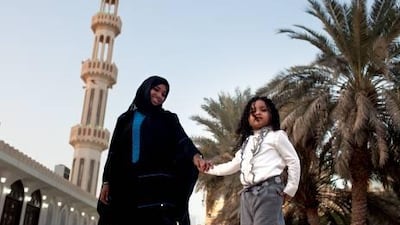Badriya Al Falahi said raising her seven children as a single mother taught her a valuable lesson - a degree is worth much more than a husband.
Mrs Al Falahi said her story, told as Sheikh Mohammed bin Rashid prepares to celebrate motherhood on January 4 at the anniversary of his accession, shows how perseverance can rub off on one's children, leading them to succeed in their own lives.
Having married when she was only 18, Mrs Al Falahi found herself supporting six daughters and a son on her own after her divorce. She recalled travelling in taxis to drop her children off at school.
"When Noora joined the military school, I had to drop her off as early as 5am," she said.
She did not finish her own studies because that would have meant leaving her children out and about on their own playing in the street while she was attending classes in evening school.
Being a single mother without a degree and no work potential, her family suffered through lean financial times for years, she said.
"We felt the difference after the break-up because my father had a lot of money," said her daughter Noora. "We couldn't buy what we desired and couldn't change our pair of shoes whenever we wanted to.
"My mother didn't want to take him to court because of the nice memories between them. She feared for his health as well, and because she didn't want to humiliate the father of her children."
Mrs Al Falahi even refused to accept the many suitors who proposed to her, because she didn't want a strange man raising her children.
But after a few years, the light started to shine at the end of the tunnel. Some of her daughters started working and some got married, and she inherited a fortune from her father.
Now 49, Mrs Al Falahi said she always wanted her daughters to finish their studies before getting married because "a degree is more important than the man; the degree will last them forever, but the man might not".
She also made sure all her daughters learnt how to drive, so they could be independent.
Noora said she and her siblings were trying their best to repay her.
"We always take her with us when we travel, we give her gifts every day, things that other people are not used to giving their parents constantly," she said.
Noora, a 30-year-old mother of two, said she inherited a lot of her mother's sense of sacrifice.
Although she was more interested in pursuing a career as a doctor, she enrolled in the military's academic programme so the Government would sponsor her degree in health information management and pay her a salary at the same time.
"When my salary was issued, I would give my bank card to my mother so she could pay for the house expenses," she recalled. "I also force myself to stay in some jobs, even if I don't feel like they suit my career path, but to be able to provide the best for my daughters and to show them how they have to work hard to receive their prize in the end."
She also persuaded her husband to enrol in college over his plans to depend on his father's wealth.
"I explained to him how in a few years he will regret not finishing his studies after he sees his friends filling big posts, and how his children might be ashamed of him and he won't even know how to deal with them and raise them if he wasn't educated," she said.
Her husband is now studying business administration at Abu Dhabi men's college and is looking forward to his master's degree.
"Now he is competing with me. I wanted to start my master's; he asked me to wait for him so we can do it together," she said.


